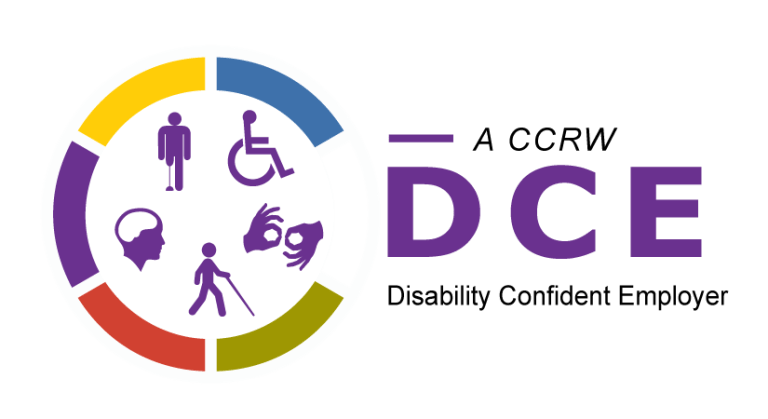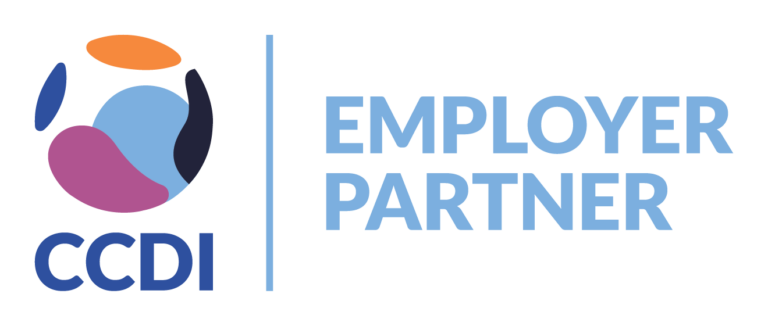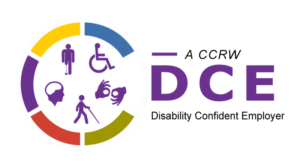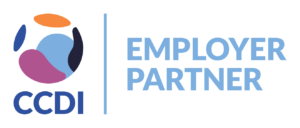Ensuring Equal Access to Services
The Career Foundation is dedicated to providing equal access to our services. In accordance with the Accessibility for Ontarians with Disabilities Act (AODA), we have created a Policy to ensure that our services are equally accessible by persons with disabilities. We are committed to providing customer service excellence.
Services provided by The Career Foundation to persons with disabilities all follow four key principles:

Dignity
Services will be provided in a manner that takes into account the individual's needs.
Integration
Persons with disabilities will benefit from our services in the same place and in the same way, or in a similar way, as persons without disabilities — provided no alternate measures are necessary to meet their needs.
Equal Opportunity
The goal-oriented outcomes of our services will be set in the same fashion for persons with disabilities as they are for persons without disabilities.
Independence
Services provided to persons with disabilities will be provided in such a way that respects their independence.
Diversity and Inclusion
The Career Foundation is committed to diversity and inclusion and aims to create a healthy and rewarding environment for all. We welcome applications from qualified individuals who represent the diversity of the people we proudly serve, including, but not limited to, visible minorities, women, persons with disabilities, Indigenous peoples, and individuals of all genders and sexual orientation.
The Career Foundation, in accordance with the Accessibility for Ontarians with Disabilities Act (AODA), is also committed to accommodating applicants with disabilities throughout the recruitment process. We will work with candidates requesting accommodation at any stage of the hiring process.
Multi-Year Accessibility Plan
The Career Foundation’s Multi-Year Accessibility Plan sets out the steps that our agency has taken and plans to take in the future in order to prevent and remove accessibility barriers in accordance with the Accessibility for Ontarians with Disabilities Act (AODA).
Customer Service Policy for Providing Services to Persons with Disabilities
In accordance with the Accessibility for Ontarians with Disabilities Act
The Accessibility for Ontarians with Disabilities Act (AODA) is a law passed by the Ontario legislature that allows the government to develop specific standards of accessibility and to enforce them. The standards are made into laws called regulations, and they provide the details to help meet the goals of the AODA.
The AODA is the foundation on which the standards are built. The purpose of the accessibility standards is to move organizations in Ontario forward on accessibility.
The Career Foundation is dedicated to providing equal access to our services. Our vision and goal is to be accessible to everyone who requires our services. In accordance with the Accessibility for Ontarians with Disabilities Act (AODA), The Career Foundation developed this policy to ensure that our services can be equally accessed by persons with disabilities. We are committed to providing customer service excellence, including meeting the needs of people with disabilities in a timely manner.
The services provided by The Career Foundation to persons with disabilities will be provided with the following key principles:
- Dignity: Services will be provided in a manner that takes into account each individual's needs.
- Independence: Services provided to persons with disabilities will be provided in such a way that respects their independence.
- Equal opportunity: The goal-oriented outcomes of our services will be set in the same fashion for persons with disabilities as they are for persons without disabilities.
- Integration: Except when alternate measures are necessary to meet the needs of people with disabilities, persons with disabilities will benefit from our services in the same place and in the same way, or similar way, as persons without disabilities.
Persons with disabilities are permitted to access our services with use of their own assistive devices. Some examples of assistive devices include wheelchairs, canes, hearing aids, and laptops with screenreading software or communicating capabilities.
Some of our offices provide assistive devices such as computers with ZoomText software and computer stations that are wheelchair accessible.
We train our workers and volunteers on how to serve persons with disabilities who use assistive devices.
Persons with disabilities who are accompanied by a support person are welcome at all offices of The Career Foundation.
We train our workers and volunteers on how to serve persons with disabilities who are accompanied by a support person.
Service animals including but not limited to hearing dogs, guide dogs, and other certified service animals are permitted entry to all of The Career Foundation’s offices.
We train our workers and volunteers on how to serve persons with disabilities who utilize service animals.
The Career Foundation will ensure that its service areas provide appropriate notice in the event of a planned or unexpected disruption to the facilities or services used by persons with disabilities. Such notices will include the disruption’s anticipated duration, the reason for the disruption, and whenever possible, alternative facilities and services that can be accessed.
The Career Foundation ensures that all its workers and volunteers who provide services to the public receive appropriate training.
The training will include:
- The purposes of the Accessibility for Ontarians with Disabilities Act
- The requirements of the Customer Service Standard
- How to interact and communicate with persons with various types of disabilities
- How to interact with persons with disabilities who use assistive devices
- How to use the assistive devices that are available at our offices
- How to interact with persons with disabilities who are accompanied by a support person
- How to interact with persons with disabilities who are accompanied by a service animal
- What to do if a person with a disability is having difficulty accessing The Career Foundation’s services
AODA training is mandatory for all workers and volunteers.
Our Managers and Program Coordinators help to ensure that new workers and volunteers complete this training within two weeks of joining our organization.
Workers and volunteers will receive ongoing training, when practicable, in connection with changes to our applicable policy, practices and procedures that govern the way The Career Foundation provides services to persons with disabilities.
If a person with a disability is having difficulty accessing our services, please inform us of this situation by using any of the communication methods provided in our Feedback Process below. Let us know what alternative methods of service would be more accessible to you so that we can assist you better.
The Career Foundation is a certified Service Excellence organization. We are committed to providing customer service excellence to all of our clients.
Feedback pertaining to how The Career Foundation provides services to persons with disabilities may be provided by a person with a disability in the manner that is most appropriate to them. Below are the optional methods that we currently have in place by which feedback can be shared.
In person, over the telephone, or via e-mail with any Manager or Program Coordinator:
Feedback can be shared with any of our Program Managers or Coordinators in-person at any of our locations, over the telephone, or via e-mail. All of The Career Foundation’s offices use a Voice over Internet Protocol (VoIP) phone system that includes texting capabilities. You may contact us via our toll-free number at 1-855-223-8231, or through the direct contact number for any of our offices as posted on our website at careerfoundation.com/contact-us/.
Over the telephone, via e-mail, text message or in person by appointment with the Workplace Coordinator:
Feedback can also be shared with our Workplace Coordinator via e-mail, telephone, text message, or in person by first setting up an appointment. The contact information for our Workplace Coordinator is:
Email: WorkplaceCoordinator@CareerFoundation.org
Phone: (416) 642-2407
Regardless of the method chosen, please provide contact information that includes your name.
Complaints received will be reviewed by the leadership team and immediate action will be taken to address the issue where practicable. Appropriate measures will be determined on a case by case basis.
All feedback is welcome and will be used to enhance our related policies, procedures, and practices.
We aim to answer all feedback by the end of the following business day.
This policy and other documents related to how The Career Foundation provides services to persons with disabilities will be made available upon request, and may be made available in an alternative, mutually agreeable format upon request whenever practicable. Accessible formats to the extent possible of other documents that we provide to the public can also be made available, upon request.
If a person with a disability asks for a document in a different format, we may want to discuss what options they have available to them and then agree on the format we will provide.
Should you wish to receive any of our related or publicly available documents in an alternative format, please contact us at any of the communication methods outlined earlier.
The most current version of this Policy will be posted on The Career Foundation’s website at all times.
The AODA uses the Ontario Human Rights Code definition of disability. It includes disabilities of different severity, visible as well as non-visible disabilities and disabilities of which the effects may come and go. It also includes sensory disabilities (e.g., hearing and vision), learning disabilities and physical disabilities.
Disability (AODA 2005)
A Disability is:
- any degree of physical disability, infirmity, malformation or disfigurement that is caused by bodily injury, birth defect or illness and, without limiting the generality of the foregoing, includes diabetes mellitus, epilepsy, a brain injury, any degree of paralysis, amputation, lack of physical co-ordination, blindness or visual impediment, deafness or hearing impediment, muteness or speech impediment, or physical reliance on a guide dog or other animal or on a wheelchair or other remedial appliance or device,
- a condition of mental impairment or a developmental disability,
- a learning disability, or a dysfunction in one or more of the processes involved in understanding or using symbols or spoken language,
- a mental disorder, or
- an injury or disability for which benefits were claimed or received under the insurance plan established under the Workplace Safety and Insurance Act, 1997.
Service Animal (AODA 2005)
An animal is a service animal for a person with a disability,
- if it is readily apparent that the animal is used by the person for reasons relating to his or her disability; or
- if the person provides a letter from a physician or nurse confirming that the person requires the animal for reasons relating to the disability.
A service animal is not a pet.
Support Persons (AODA 2005)
Support person means, in relation to a person with a disability, another person who accompanies him or her in order to help with communication, mobility, personal care or medical needs or with access to goods or services.



This Employment Ontario service is funded in part by the Government of Canada and the Government of Ontario.









